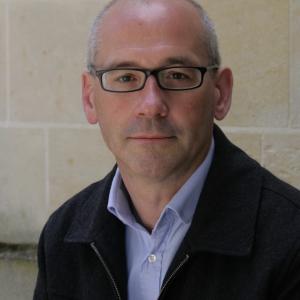
4:00 PM
Harkness Chapel, Classroom
Music colloquia provide a weekly forum for presentation and discussion of recent research by distinguished visitors and CWRU faculty and graduate students in musicology, historical performance practice, and music education.
All talks happen on Fridays at 4:00 PM (Eastern) and are open to the public unless noted otherwise.
About the Talk
“Music, Liturgy, and the Soundscape of Early Modern France: The 1641 Translation of Saint Martin’s Relics to Tours”
In July 1641, the people and churches of Tours welcomed a relic of Saint Martin to their city with an elaborate three-day celebration and procession. The Archbishop of Tours (successor to Saint Martin himself, who had been Bishop in 372-97) oversaw the festivities, and it was to the Abbey of Marmoutier (founded by Saint Martin, on the other side of the river Loire to the cathedral) that the relics were being translated. But in a surprising twist, the clergy of the Basilica of Saint Martin (founded over the saint’s grave by his successors as bishop of Tours) do not seem to have participated at all, despite the centrality of their church to the cult of the saint.
Setting this event in the context of the wider history of monastic reform, and the conflicts between the regular clergy and the bishop of Tours that came to a head in the 1620-50s, this paper will consider six anonymous musical works for 6-8 voices that seem to make reference to the translation ceremony and that may have been performed as part of the procession. By focusing particularly on evidence related to the “soundscape” of this event – a long letter written by a monk who participated in the event and its planning, and descriptive liturgical sources - it is possible to shine new light on the complex relationship between the three religious institutions dedicated to Saint Martin.
About the Speaker
Dr. Peter Bennett is Professor of Music and Coordinator of Graduate Studies in Historical Performance Practice at CWRU. Active as both a scholar and performer, Peter Bennett teaches in the Musicology and Historical Performance Practice programs at CWRU. A scholar of early-modern France – focusing in particular on the intersection of music, religion, and politics in Louis XIII’s Paris – he has also long been active as a harpsichordist and organist, in Europe (where he studied) and the USA. Bennett holds degrees from Cambridge (B.A./M.A., Natural Sciences), King’s College, London (M.Mus.), and Oxford (D.Phil.), and was appointed to the CWRU faculty in 2005. In addition to presenting at numerous conferences in the US, UK, and France, he has published articles in the Journal of the American Musicological Society, Early Music, and the Revue de Musicologie, and his first book, Sacred repertories in Paris under Louis XIII (Ashgate, 2009), appeared in the Royal Musical Association Monograph series (a “magisterial study”, Early Music). In 2015-16 he held a Le Studium fellowship at the Centre d’Études Supérieures de la Renaissance, Tours, where his research centered on Louis XIII’s ceremonial entrées. The project culminated in an international conference on early modern ceremonial, and in the publication (with Bernard Dompnier, co-editor) of Cérémonial politique et cérémonial religieux dans l’Europe modern: Échanges et métissages (Classiques Garnier, 2020). Research from this fellowship also informed his most recent book, Music and Power at the Court of Louis XIII: Sounding the Liturgy in Early Modern France (Cambridge University Press, 2021), a study of power and absolutism as seen through the lens of court liturgical and musical practices (“charts a masterful journey”, Journal of the American Musicological Society.) He is currently working on a number of projects related to music and provincial French ceremonial. Bennett studied organ in Cambridge (Nicolas Kynaston) and Vienna (Peter Planyavsky) before taking up the harpsichord, studying in London (Jill Severs) and Siena (Academia Chigiana, Kenneth Gilbert). As the founder of Ensemble Dumont (1995-2003), a consort of singers, viols and continuo which he directed from the keyboard, he has appeared in the UK and Europe, performing at the Bruges (Belgium) and Innsbruck (Austria) Early Music Festivals, the MDR-Sommer Festival (Germany), and the Wigmore Hall, London, also broadcasting on the BBC, RAI (Italy), MDR/SWR (Germany), and R3 (Belgium). The ensemble’s recordings for Linn Records received accolades from Gramophone Magazine (Editor’s Choice “meltingly gorgeous”, and Critics’ Choice “one of the year’s most beautiful releases … sublime performances”), Diapason (“Est-il pourtant disque plus sensuel, plus ravissant que celui-ci?”), BBC Music Magazine (”performed with gracefulness and sensibility”), Le Monde de la Musique, and others. In Cleveland, Bennett teaches harpsichord in the CWRU HPP program and at CIM (where he is Head of Harpsichord) and has played with Apollo’s Fire, the Cleveland Baroque Orchestra, since 2006.
University Health and Counseling Services (UH&CS) is committed to protecting the health and well-being of our campus community. Masking is not required on campus, but those who wish to wear masks may do so. Individuals with symptoms of COVID, who have recently completed isolation for COVID, or who have been exposed to COVID should wear a well-fitting mask, as per COVID guidelines.

